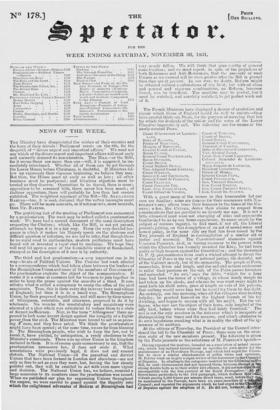NEWS OF THE WEEK.
THE Ministry have disappointed the wishes of their enemies and the fears of their friends : Parliament meets on the nth, for the despatch of " divers urgent and important affairs." We need not say which of the divers urgent and important affairs will most early and earnestly demand its consideration, THE BILL—or the Bills, for it seems there are more than one—will, it is supposed, be im- mediately introduced. Whether all of them can be got through the Lower House before Christmas, is doubtful. If Ministers fol- low up vigorously their vigorous beginning, we believe they may. But then, the House must sit early as well as late ; all other business must be postponed ; and frivolous objectors must be treated as they deserve. Opposition to be feared, there is none ; opposition to be reasoned with, there never has been much ; of factious opposition, there will probably be less than last session exhibited. The weightiest opponent of Bill—Mr. ALEXANDER BARING—has, it is said, declared that the rotten boroughs must go. There will be more converts, or if not converts, more neutrals, than Mr. BARING.
The gratifying fact of the meeting of Parliament was announced by a proclamation. The week may be indeed called a proclamation week. We have had a second document of the same description respecting the Cholera ; which, like the Bill, is not yet passed, although we hope it is in a fair way. From the very decided lan- allege in which it makes his Majesty speak on the abstruse and difficult question of infection, we are led to infer, that though there be no royal road to mathematics, modern politicians must have found out or invented a royal road to medicine. We hope they will next hit upon a cure of the formidable visiter at Sunderland, stamped as the description of it now is by authority.
The third and last proclamation—a very important one in its way—treats of Political Unions. The Courier last week alluded to a correspondence which had taken place between the leaders of the Birmingham Union and some of the members of Government ; the proclamation explains the object of the communication. It seems it is a crime at common law for two men to join together in order to keep the peace against the assaults of a third. It con- stitutes what is called a conspiracy to usurp the office of the civil magistrate. True, this is done everyday in every town and village of England ; but then it is in a small way. The Birmingham Union, by their proposed regulations, and still more by their names of tithingman, constable, and alderman, proposed to do it by wholesale. No wonder the constabulary and magistracy were alarmed at a plan which was calculated to reduce them to a state of formal inefficiency. Nay, in the term " tithingman" there ap- peared to lurk some covert design against the integrity of a higher power than the civil. The Ministers were bound to act in so press- rease, and they have acted. We think the proclamation might have been spared; at the same time, we are far from blaming it. The Birmingham people, who wish to keep the law, not to break it, have yielded, by anticipation, a ready obedience to the Minister's commands. There was no other Union in the kingdom included in them. It is of course quite unnecessary to say, that the proclamation 'announces law, it does not make it. What associations were previously legal, it does not and cannot disturb. The National Union—all the parochial and district Unions that have been formed in London and elsewhere—are not only as free to act as ever they were, but, having the law clearly pointed out, they will be enabled to act with even more vigour and decision. The National Union has, we believe, received a large accession to its numbers since the proclamation was issued. When we published our plan for organizing Unions throughout the empire, we were careful to guard against the illegality into which the enlightened advocates of Reform at Birmingham had very nearly fallen. We still think that plan worthy of general consideration ; and we must repeat, in spite of the prejudices of both Reformers and Anti-Reformers, that the necessity of such Unions as we counsel will be even greater after the Bill is passed than they are at present. In one way, no doubt, Reform might be obtained without combinations of any kind; but without close and general and vigorous combinations, no Reform, however liberal, can be beneficial. The machine may be perfect, but it must be watched, and carefully watched, to get perfect work out of it.


























